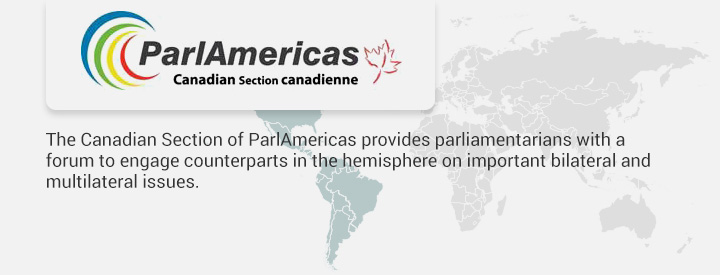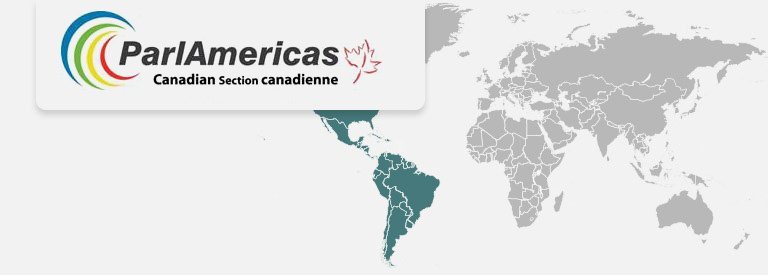Activities and Reports
Refine your search
Results: 21 - 30 of 31
July 10, 2020
Build Back Better: A Green and Sustainable Economic Recovery - By videoconference - Canadian Section of ParlAmericas (CPAM)
Diego Paulsen, President of Chile’s Chamber of Deputies, and Elizabeth Cabezas, President of ParlAmericas and a member of Ecuador’s National Assembly, provided welcoming remarks. Ana Belén Marín, President of ParlAmericas’ PNCC and a member of Ecuador’s National Assembly, moderated a session at which the following individuals made presentations: Leo Heileman, Regional Director of the Latin America and the Caribbean Office of the United Nations Environment Programme (UNEP); Raúl Salazar, Head of the United Nations Office for Disaster Risk Reduction Regional Office for the Americas and the Caribbean; and Brian O’Callaghan, a researcher at the University of Oxford’s Smith School for Enterprise and the Environment.
Mr. Heileman began by noting the high number of zoonotic diseases that have emerged in recent years, attributing their increased frequency to human impacts on the natural environment. In characterizing climate change as a larger crisis than COVID-19, he suggested that now is the time to "reactivate" the economy, generate “decent” work and try to meet the needs of the most vulnerable groups. Mr. Heileman outlined several areas that UNEP has identified as having the potential to help reactivate the economy while benefitting the climate. These include: rural, agricultural and ecosystem resilience; urban resilience; renewable energy and energy efficiency; and the transition to electric vehicles and e-mobility.
Mr. Salazar spoke about the double impact of COVID-19 and climate disasters – such as heavy rain, powerful tropical storms and droughts that are more intense, frequent and widespread – in numerous countries in the western hemisphere. In his view, governments must take an integrated, intersectional approach to risk management. He also described actions that could reduce vulnerability and enhance resilience in general, and outlined some roles for parliaments in applying disaster risk reduction approaches and supporting investments in climate change adaptation.
Mr. O’Callaghan summarized the results of his recent study on the possible benefits of a "clean" recovery from the COVID-19 pandemic; the study was based on a review of stimulus policies from the 2009 global financial crisis and a survey of more than 230 economists from the G20 countries. His study concluded that climate-related spending could enhance economic growth during the recovery from the pandemic. Mr. O’Callaghan emphasized the importance of using stimulus spending to achieve long-term climate objectives and not just short-term gross domestic product growth.
Paola Vega, Vice-President (Central America) of ParlAmericas’ PNCC Change and a member of Costa Rica’s Legislative Assembly, gave closing remarks.
June 22, 2020
Joint Briefing on Venezuela hosted by the International Secretariat of ParlAmericas
By videoconference
Canadian Section of ParlAmericas (CPAM)
During the first panel, Global Affairs Canada (GAC) officials highlighted – among other topics – that the humanitarian situation in Venezuela was worsening and that, by June 2020, more than 5 million Venezuelans had left their home country and 7 million people within Venezuela needed humanitarian aid. They also noted the Government of Canada’s continued engagement with partners in Venezuela and internationally to find solutions to the situation in Venezuela, and the Government’s contribution of $27 million for humanitarian aid to support Venezuelan refugees and migrants.
During the second panel, Eduardo Stein – Joint Special Representative for Venezuelan refugees and migrants with the International Organization for Migration and the Office of the United Nations High Commissioner for Refugees – mentioned that, of the 5.1 million Venezuelan refugees and migrants, 4.3 million are hosted in Latin American countries. According to him, during the COVID-19 pandemic, Venezuelan refugees and migrants have been highly vulnerable to discrimination and violence, and – as of June 2020 – about 70,000 Venezuelan refugees and migrants had returned to their home country. Ben Rowswell – President of the Canadian International Council and former Canadian Ambassador to Venezuela – stated that, although addressing the humanitarian situation is currently the most important issue in Venezuela, the international community must continue to request free and fair elections in that country in 2020.
June 16, 2020
50th Meeting of the Board of Directors of ParlAmericas
By videoconference
Canadian Section of ParlAmericas (CPAM)
June 11, 2020
Sustainable Responses for a Post COVID-19 Economic Recovery
By videoconference
Canadian Section of ParlAmericas (CPAM)
• Irwin LaRocque, Secretary General of the Caribbean Community, said that the response to the pandemic must take into account the effects of hurricane season in Caribbean countries.
• Diane Quarless, Director of the Economic Commission for the Latin American and Caribbean (ECLAC) Subregional Headquarters for the Caribbean, highlighted the economic impact of the pandemic in the Caribbean, particularly on the tourism industry, which is an important source of income for many countries in the region. She also explained that the heavy indebtedness of Caribbean states, as well as their difficulty in obtaining official development assistance, foreign direct investment or concessional lending, limits the financial resources available to these countries to respond to the crisis caused by the pandemic.
• Monika Queisser, Head of the Social Policy Division of the Organisation for Economic Co-operation and Development, gave a global overview of the economic impact of COVID-19. She also shared data showing that more women than men have lost their jobs due to the pandemic.
• Therese Turner-Jones, General Manager of the Country Department Caribbean Group of the Inter-American Development Bank (IADB), explained that the pandemic has had a significant impact on the lives of women in the Caribbean and that women must be part of the discussions and decisions involving the response to the pandemic.
During the question period, the Honourable Rosa Galvez, Senator, Vice-Chair of the Canadian Section of ParlAmericas, stressed that the way to measure economic recovery should not be based solely on GDP.
June 5, 2020
Legislating for Post COVID-19 Economic Recovery: Cooperative Dialogue Between Presiding Officers of Parliaments of the Americas
By videoconference
Canadian Section of ParlAmericas (CPAM)
Alicia Bárcena, Executive Secretary of the Economic Commission for Latin America and the Caribbean (ECLAC), gave the keynote address, highlighting how the pandemic has affected the economic situation in the Americas and Caribbean region and outlining proposals that could help mitigate its effects. She explained that ECLAC expects that, in 2020, the gross domestic product of the Americas and Caribbean region will fall by 5%, 12 million people will become unemployed, and the number of people living in poverty will increase by over 28 million in the region. She highlighted that certain population groups in the region are more likely to suffer as a result of the pandemic. For example, women make up the majority of workers in the informal labour force, they often have little in the way of savings, and they have to go outside the home to earn an income. In addition, many children and adolescents may not have access to online learning; it is estimated that only 20% have this option. Ms. Bárcena proposed the following options to respond to the economic crisis sparked by COVID-19 in the Americas and the Caribbean: establish an emergency basic income over a period of six months for people living in poverty; provide subsidies to companies based on the number of employees and the employer’s commitment to its employees; promote measures leading to a more egalitarian and environmentally sustainable economic structure; and implement universal healthcare. Ms. Bárcena highlighted the important role of parliaments in implementing these measures.
Following the keynote presentation, the presiding officers each presented the measures implemented in their countries to respond to the pandemic.
May 8, 2020
Legislative Actions for the Prevention of Violence Against Women during the COVID-19 Pandemic
By videoconference
Canadian Section of ParlAmericas (CPAM)
• Yeliz Osman, Policy Specialist on Ending Violence Against Women at the UN Women Regional Office for Latin America and the Caribbean, noted that it is too soon to reach conclusions on the impact of COVID-19 on violence against women, but emerging figures seem to indicate that it has increased during the pandemic. She explained that many countries in the Americas and the Caribbean recorded a 30-90% increase in calls to helplines for violence against women during the pandemic.
• Karina Arteaga, a member of the National Assembly of Ecuador, told parliamentarians in attendance about measures taken in Ecuador to counteract the high rates of gender-based violence. For example, the public prosecutor’s office activated an online service for victims of violence.
• Member of the Chilean Chamber of Deputies Marcela Sabat noted that government measures in Chile are aimed at expanding the capacity to receive complaints by offering the option of filing a complaint through WhatsApp or a web chat. Ms. Sabat said that women without access to the Internet or a smart phone can use the code phrase “Mascarilla 19” [Mask 19] to discreetly report violence during a visit to a pharmacy.
• Mexican Senator Verónica Camino indicated that Mexico has several legal instruments to prevent, address, punish and eradicate violence against women. She emphasized the importance of collecting and consulting data on violence against women to inform decision making and public policy formulation.
May 8, 2020
Parliaments and Pandemics: Going Virtual and Staying Open in the COVID-19 Era
By videoconference
Canadian Section of ParlAmericas (CPAM)
Other organizations participating in the webinar included Directorio Legislativo, the National Democratic Institute, the Westminster Foundation for Democracy, the OSCE Office for Democratic Institutions and Human Rights, the Latin American Network for Legislative Transparency and Parliamentary Network Africa.
Discussions during the webinar focused on the importance of legislatures remaining open and transparent during a global crisis. Participants spoke about how keeping the public informed helps legislators fulfill their representation and oversight responsibilities.
May 1, 2020
Virtual Parliamentary Sittings During the COVID-19 Pandemic
By videoconference
Canadian Section of ParlAmericas (CPAM)
Participants heard presentations by: the Honourable Juan Watterson, Speaker of the Isle of Man’s House of Keys; Luiz Fernando Bandeira de Mello, Secretary-General of the Board of Brazil’s Senate; and Matthew Hamlyn, Strategic Director of the Chamber Business Team of the United Kingdom’s House of Commons. They discussed the technical and political challenges associated with implementing virtual sittings and committee meetings in their legislatures.
Jarvis Matiya, the CPA’s Acting Secretary-General, updated participants about the CPA’s responses to the COVID-19 pandemic, including the launch of the CPA Toolkit for Commonwealth Parliaments and Legislatures on the COVID-19 (Coronavirus) pandemic and delivering parliamentary democracy.
The Honourable Bridgid Annisette-George – Speaker of Trinidad and Tobago’s House of Representatives, ParlAmericas Board Member and a member of CPA’s International Executive Committee – delivered closing remarks.
April 16, 2020
Organizing Virtual Parliamentary Sessions During the COVID-19 Pandemic
videoconference
Canadian Section of ParlAmericas (CPAM)
Participants heard presentations by: Gustavo Vasconcellos, Technology and Information Analyst in the Innovation and ICT Directorate of Brazil’s Chamber of Deputies; Miguel Landeros, Secretary General of Chile’s Chamber of Deputies; and Claudio Prieto, General Coordinator of Technology and Information of Ecuador’s National Assembly. These panellists provided a detailed account of technical and procedural measures being implemented in their country to enable legislatures to meet virtually.
February 19, 2020
Executive Committee Meeting
Ottawa, Ontario, Canada
Canadian Section of ParlAmericas (CPAM)
Results: 21 - 30 of 31 — Page: 3 of 4


